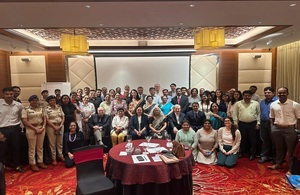UK backs Forensics Workshop in India on gender-based violence
The UK Government has participated in an International Forensics Workshop in Goa with the aim of supporting justice for victims of gender-based violence.

The workshop, convened in Panjim by Dr Pinky Anand, former Additional Solicitor General of India, brought together experts from across India and the UK from the police, prosecution, medical profession, academia, and the judiciary.
This groundbreaking approach looked at every step in the chain of custody from crime scene to courtroom. Participants examined the latest advances in forensic technology and identified opportunities to enhance investigations towards judicial outcomes for victims.
The global fight against rape and sexual assault requires a multidisciplinary approach and knowledge sharing amongst international partners is crucial. Earlier this year, Dr Anand chaired an international roundtable on taking a victim-centric approach to gender-based crime. The roundtable identified forensics as a top priority for joint future collaboration. The UK Government is proud to have supported this follow up workshop.
This workshop provided an opportunity to share best practice and operational insights on the collection and analysis of forensics evidence. Participants from the Goa community gathered to discuss topics including crime scene management, forensic chain of custody, digital and medical forensics, and presenting forensic evidence at trial.
The community will reconvene to take their discussions further in the coming months. Dr Anand will lead the development of best practice guidelines for investigators.
Former Additional Solicitor General of India, Dr Pinky Anand said:
The correct use of forensics in investigating heinous crimes such as rape and sexual assault can be decisive in delivering justice for victims. We have heard powerful testimonies from across the judiciary, prosecution, law enforcement, medical profession and academia.
Together we are determined to make a difference and to improve judicial outcomes for victims of such crimes. To that end, we will prepare best practice guidelines to ensure that evidence gets from crime scene to court room in a manner that enables justice to be done. I would like to thank all participants and in particular Justice Valmiki Menezes, Justice Asha Menon, DGP Shri Alok Kumar and Director Prosecution Ms Poonam Bharne for their support and participation.
Minister Counsellor Political and Press, British High Commission, Becks Buckingham said:
Goa’s incredible hospitality draws millions of visitors each year, including many British nationals who return with cherished memories. This workshop has provided a strong opportunity for us to express our thanks to the authorities in Goa who keep our citizens safe during their time here. We appreciate all that they do, and it has been a privilege to be a part of this discussion.
We are grateful also to Dr Anand for convening the workshop alongside Advocates for International Development (A4ID). We remain committed to deepening our cooperation with partners in India to keep British and Indian citizens safe and ensure justice is done across the Living Bridge.
Shri Alok Kumar, Director General of Police, Goa, said:
Forensic science and technology are indispensable in modern policing, bridging the gap between the crime scene and the courtroom.
With advancements like the state-of-the-art Goa State Forensic Laboratory (GSFSL), cyber forensic labs, and National Automated Fingerprint Identification System (NAFIS), Goa Police is committed to ensuring justice through scientific precision. Addressing challenges like cybercrime and cross-border illicit networks necessitates enhanced mutual cooperation among countries.
Protecting women and tackling rape and sexual assault remains a priority for the UK government, using a whole of system approach to tackle these horrific crimes, bringing offenders to justice and providing support to victims and survivors.
Further information
-
The UK delegation includes retired Judge Brian Barker CBE KC, Central Criminal Court of England and Wales, Professor Robert Green, University of Kent, and Mr Charles Dickinson, Ernst & Young UK.
-
Operation Soteria was developed in response to national concern around the investigation of rape and serious sexual assault offences (RASSO). Its aim was to increase the number of adult rape and serious sexual assault cases reaching charge and deliver sustained improvement in the criminal justice whole of system response.
-
This has led to the development of the first National Operating Model (NOM) for the investigation of rape and serious sexual offences. In July 2023, Operation Soteria was rolled out across all 43 police forces in England and Wales, and the National Operating Model will be implemented in all forces. The model requires detailed engagement with key stakeholders, such as Independent Sexual Violence Advocates, the third sector, police and crime commissioners, and wider policing organisations including the National Police Chiefs’ Council (NPCC) and College of Policing.
-
The UK hopes to find more ways to collaborate effectively and get closer to putting a stop to rape and sexual assault and protect our communities around the world.
-
The UK and India annually hold the home affairs dialogue to overview cooperation between our law enforcement agencies.
-
In April 2023, Home Office Permanent Under Secretary Sir Matthew Rycroft visited Goa, holding discussions with the Indian officials to improve joint capabilities to protect the public, develop a joint understanding of key threats, enhance Border Security and support Law Enforcement cooperation.
Media
For media queries, please contact:
David Russell, Communications Counsellor and Spokesperson,
British High Commission, Chanakyapuri,
New Delhi 110021. Tel: 24192100
Media queries: [email protected]
Follow us on Twitter, Facebook, Instagram, Flickr, Youtube and LinkedIn